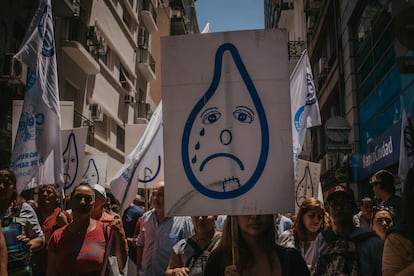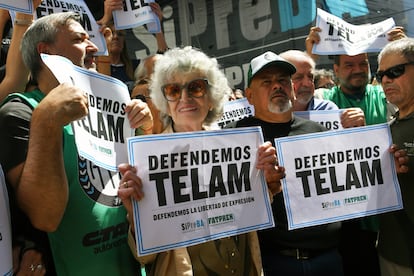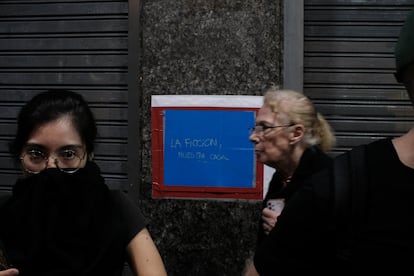President Javier Milei fires 24,000 government workers in Argentina: ‘No one knows who will be next’
Public sector employees denounce that the cuts will put many state functions on hold

Javier Milei believes that the state “is the enemy” and “a criminal organization” which he seeks to reduce to its minimum size. He’s doing this amidst criticism and applause from a deeply polarized society. When he took office as president of Argentina in December 2023, the state had 341,477 people employed. Two months later, Milei’s administration had already eliminated 9,000 jobs. And, this past week, 15,000 more layoffs were ordered. New dismissals are expected in the middle of the year… but nobody knows how many jobs will be slashed, nor who will be fired.
Some 50,000 workers are living in this climate of uncertainty, most of them on temporary contracts. In the past, these non-permanent positions were renewed once a year. At the moment, these individuals know that they’ve survived the first stage, but their positions will still be under review for three or six more months.
“We’re experiencing a situation of psychological terror,” said a worker from the National Secretariat for Children, Youth and Family last Wednesday. She — like other interviewees — was afraid to give her name to EL PAÍS, due to possible reprisals from the government.
“Milei said that there were going to be 70,000 layoffs. Then, he said 15,000 or 20,000. This back-and-forth impacts our mental health and daily life. Everyone is frozen without knowing what’s going to happen, no one knows who will be next,” she added, just hours before superiors began to notify those who weren’t going to have their contracts renewed (they expired on March 31). That Secretariat is the most affected state agency, with 1,656 casualties, almost half of the 3,600 employees in the entire Ministry of Human Capital.

Milei — an economist and TV panelist by profession, who defines himself as an anarcho-capitalist — announced from day one that major cuts to the state bureaucracy were coming. As a first measure, he demanded 100% in-person work (eliminating telecommuting) to unmask the “gnocchi,” as the fictitious state workers are known in Argentina. These individuals are placed in their positions by political parties, as a way to return favors: they only go into the office once a month to pick up their salaries. The use of the term “gnocchi” — a typical Italian dish — is because, in Argentina, this meal is typically served on the 29th of each month, which is close to payday.
About to complete four months in office, Milei’s order was to reduce between 15% and 20% of the state personnel who are on temporary contracts. The official argument is that Argentina is “an impoverished country” with a state that’s too large and inefficient. “It seems to me that there’s a fairly general consensus in society to not continue paying for things that don’t match the Argentina we live in,” presidential spokesman Manuel Adorni said on Wednesday, March 27. As of mid-2023, Argentina was seventh on the list of OECD countries — only below Norway, Sweden, Denmark, Iceland, Finland and France — in terms of the ratio of state workers to the number of employed people. In qualitative terms, however, the country places below the middle of the ranking in a World Bank index that measures governmental effectiveness: Argentina obtained a score of 41.9 out of 100 in 2022.
For weeks, several employees sensed that their names were on the layoff list. This was the case of those who worked in the state advertising division, which Milei shuttered for a period of at least one year after his inauguration. “An office that functioned smoothly was paralyzed and we were left without duties,” says one of the workers, who was ultimately fired from that department. She regrets that, due to this official decision, the government hasn’t launched a dengue prevention campaign in the media, even though Argentina is going through the worst outbreak in its history, with more than 150,000 cases and 106 deaths.
Over the course of a few months, employees in this division went to work every day for eight hours… but they had nothing to do. “It was psychological torture,” the dismissed interviewee laments. Her biggest fear — confirmed two days ago — was being left without the health insurance provided by the state, which was allowing her disabled son to access treatments. The provision of this vital service will now be interrupted.
A closed labor market

Many fired state employees tried to find work in the private sector, but almost none succeeded. Argentina is in the middle of an economic crisis and a collapse in consumption, with most companies slashing workforces rather than hiring staff. This past January, the last month with official data, economic activity fell 4.3% compared to 12 months earlier, the worst contraction since the Covid-19 pandemic.
In his last public appearance, the presidential spokesperson assured the media that the selection of the employees who were going to be fired was an “extremely surgical task, done so as not to make mistakes.” Those interviewed, on the other hand, believe that the dismissals were done at random. Among those fired are people who began working in the state bureaucracy during previous center-left administrations, as well as those who began during the right-wing administration of Mauricio Macri (2015-2019), whose party is now an ally of Milei in the National Congress. Young people just starting out have been fired, as have public servants who are nearing retirement age. Many have lost their sole source of income to support dependent family members, while even some union representatives have been dismissed (even though it’s technically illegal to fire them).
“There was no specific criteria in the [compilation of the] lists. They fired people who had joined in recent years and others with 15 or 20 years of experience,” Natalia affirms. She’s worked with the Road Safety Agency since 2017. “Each employee was summoned by their immediate superior and told that their contract wasn’t going to be renewed. We went down from different floors, all crying because we didn’t understand why,” she sighs.
Natalia feels that it was irresponsible to have dismissed staff from this agency just before a six-day-long weekend: “All agents should be on the road doing blood alcohol and speed checks. This shows the government’s total disinterest in road safety.”
The unions have organized protests in front of official buildings amidst a tense atmosphere. Last week, at the doors of the Human Rights Secretariat, a bodyguard for Secretary Alberto Baños “attempted to pull out a firearm in front of the workers,” according to the State Workers Association (ATE), which represents half of the nearly 1,000 workers in the Secretariat. “We don’t resort to violence to exercise our right to express our disagreement [with government policy] and we hope that officials are up to the task,” the union’s statement reads. “In no way are we going to permit acts of intimidation.”
The sources consulted for this report agree that the layoffs have been much higher than what took place at the start of Macri’s administration. Disorganization has also been higher. There are offices that still don’t have a designated director, while others have seen two, or even three bosses pass through in just four months. The situation is similar beyond the public administration, in state-owned companies and government organizations. EL PAÍS has selected some testimonies that give an overview of the situation.
The silencing of public media
In February, Milei decreed the curtailing of all state media for one year, as part of a plan for the “reorganization of public companies.” In some cases, such as at Radio Nacional or TV Pública, there have been layoffs. In others, such as at Télam, the state news agency which Milei has said he wants to close, all workers have been suspended and prevented from accessing the facilities. “The agency has been silenced for 24 days,” says 33-year-old Braulio Cabrera. He’s a union delegate and works in the agency’s photographic archive, which preserves historical material that workers fear is “at risk” due to the new measures.
Micaela Polak, a producer at Radio Nacional, says that there’s “a lot of anxiety” among public media workers. “This has a lot to do with what’s happening at the communication level with the government. We find out about things unexpectedly and there are many rumors,” she notes. At Radio Nacional, 500 contracts were terminated in January. Polak wasn’t among them, but she criticizes the precarious situation faced by her colleagues, many of whom earn a basic salary of 380,000 pesos ($380) and don’t have permanent contracts. “There’s a myth that we earn a lot and the truth is that we don’t. My colleagues who have to raise children alone or who are renters need to work two or three jobs,” she explains.
At Radio Nacional, regular programming has been interrupted on holidays to save worker hours. And representatives of Milei’s administration continue to repeat that “there is no money.”
“This never happened before. Not only does it mean a loss of salary, it means that we’re unable to provide [proper programming]. Only music will be broadcast from Buenos Aires and some news bulletins,” the producer laments. Polak also points out the social function that radio plays in some parts of the country, where local stations allow residents of remote places to send and receive messages. “The service in those areas is essential.”
Scientific research, in crisis
At the National Scientific and Technical Research Council (CONICET) — the main scientific research organization in Argentina —, 140 layoffs have been recorded so far. But the chainsaw has also passed through doctoral scholarships, with a reduction from 1,300 in 2023 to a current figure of only 600. The research budget has also been cut: on paper, it’s unchanged from last year, but it’s actually only equivalent to a third of the value due to surging inflation.
“We’re facing the impossibility of continuing many research investigations,” warns Nuria Giniger, a CONICET researcher and union delegate. Among these projects, she emphasizes, some are key for the country, such as those that have to do with diseases like dengue or chagas.
“Work stress has multiplied by a thousand. They started by firing the administrative staff and reducing the scholarships, but who’s to say that they’re not going to continue [cutting] researchers and support staff?” She recalls that, during his presidential campaign, Milei said that “CONICET, as it exists today, must be closed.”
Less Argentine cinema
Braulio Vega Santana, 20, demonstrated more than 10 days ago in front of the doors of the Gaumont Cinema, a historic movie theater in Buenos Aires that the government wants to sell off. It was the epicenter of a protest against the “drastic reduction” of financing for the film industry that’s taking place under the new government.
Vega Santana is now preparing to protest again, this time against the layoffs at the National Institute of Cinema and Audiovisual Arts (INCAA) and the termination of contractors like himself. His last day of work was on Wednesday, March 27. He worked in a section that was dedicated to overseeing one of the institute’s funds. “It’s called Brief Stories, it’s perhaps the most important [grant]. From there, personalities like [internationally-renowned filmmaker] Lucrecia Martel have emerged. Today, the two of us who carried out [the distribution of] that grant are now unemployed,” Vega Santana says.

For four months, he states, the delivery of funds for audiovisual projects — many of which have competed at international film festivals as recently as 2022 — “has been frozen.” The Milei administration appointed the new president of INCAA, Carlos Pirovano, only at the end of February. The economist, who has no experience in the audiovisual sector, immediately signed a series of decrees to remove financial support from INCAA initiatives in the provinces. He also cancelled the contracts of some staff members, suspended overtime payments and put an end to covering the travel expenses, phone bills, food and transportation of the institute’s employees who have to work beyond Buenos Aires. “He has the same rhetoric as Milei and is firing employees who earn very little. We don’t know what his plan is within the INCAA. He’s a [director] who came exclusively to cut,” Vega Santana affirms.
For workers in the cultural sector, not only are jobs at stake. For Vega Santana, access to culture and the diversity of artistic, theatrical and literary production is at risk. “The INCAA allows producers from any part of the country – with any ideology – to make a film without a [huge] budget. It’s an act of censorship towards the industry that someone who wants to produce now has to go through a Netflix filter,” he laments.
The Argentine Chamber of Bookstores made a similar criticism when it took issue with Milei’s recently-proposed omnibus bill, which included more than 600 measures that were ultimately not approved. The organization stated that the legislation endangered the “varied and bibliodiverse network of bookstores and publishers” in the country.
Translated by Avik Jain Chatlani.
Sign up for our weekly newsletter to get more English-language news coverage from EL PAÍS USA Edition
Tu suscripción se está usando en otro dispositivo
¿Quieres añadir otro usuario a tu suscripción?
Si continúas leyendo en este dispositivo, no se podrá leer en el otro.
FlechaTu suscripción se está usando en otro dispositivo y solo puedes acceder a EL PAÍS desde un dispositivo a la vez.
Si quieres compartir tu cuenta, cambia tu suscripción a la modalidad Premium, así podrás añadir otro usuario. Cada uno accederá con su propia cuenta de email, lo que os permitirá personalizar vuestra experiencia en EL PAÍS.
¿Tienes una suscripción de empresa? Accede aquí para contratar más cuentas.
En el caso de no saber quién está usando tu cuenta, te recomendamos cambiar tu contraseña aquí.
Si decides continuar compartiendo tu cuenta, este mensaje se mostrará en tu dispositivo y en el de la otra persona que está usando tu cuenta de forma indefinida, afectando a tu experiencia de lectura. Puedes consultar aquí los términos y condiciones de la suscripción digital.








































